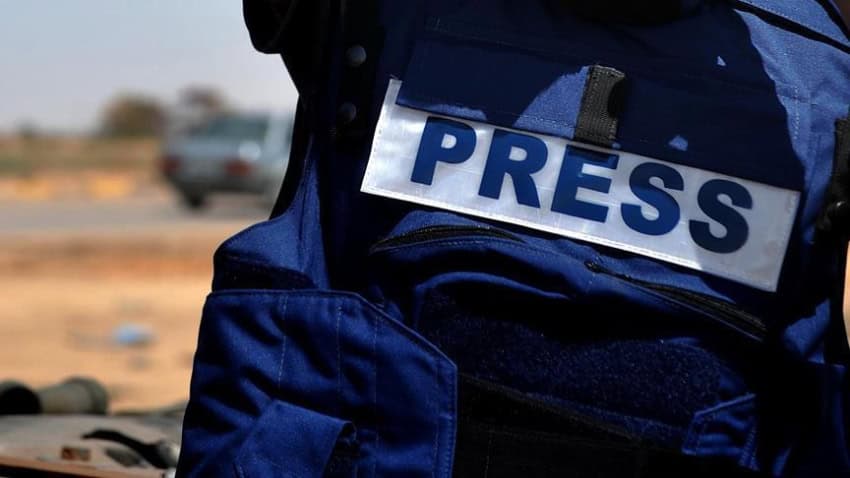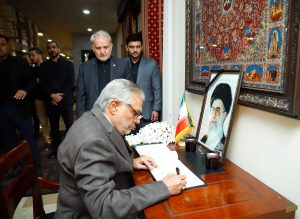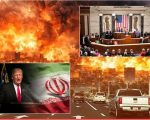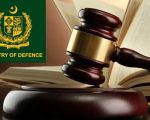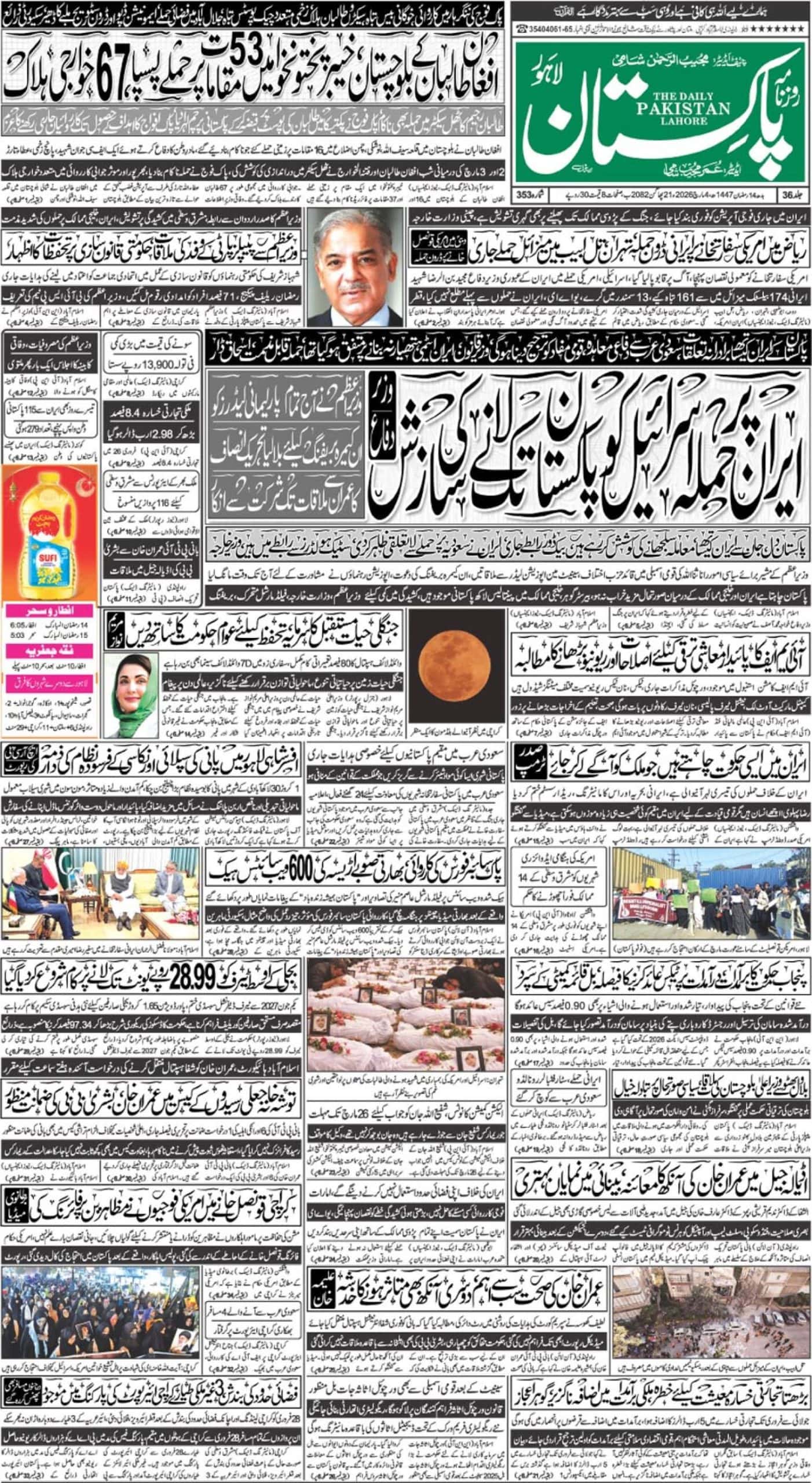For months, Asad Kharal has not sat on the rooftop of his house with the family to sip tea and watch the sunset for one year. He used to indulge in sunset watching and chatting with his two little sons and wife before heading towards TV channels where he was to appear as a guest analyst before going to his Bol office to run his own late-night program.
Now, the rooftop looks like a police post: a bunker is manned by gun-toting police officials, while the boundary wall has been fortified with barbed wires.
“It seems my life has been held hostage and it’ll never be the same again,” he sighs, adding that “but I don’t regret it.”
Police officials have been deployed at his residence. There are 16 surveillance cameras installed watching over his house and the street.
The life of Asad Kharal, anchor and investigative journalist and author of multiple books, changed dramatically when he was attacked by a group of nine people on June 5, 2018, near the Lahore airport, in the jurisdiction of the North Cantonment police station, when he was heading home after landing from Karachi. Six people got involved in a physical attack on him leaving him in a pool of blood. They left his left arm and right thumb fractured and a deep wound in the head. They fled after snatching his two mobile phones and a USB. With both phones gone, he lost his thousands of valuable sources’ contact details and messages and documents about scams reported and yet-to-be reported.
After spending eight days in the Services Hospital, ensuing days left him in s state of disbelief.
“The airport attack is not an isolated attack. After that, I have survived at least three more attacks and in these attacks, those who should have protected him were involved,” he discloses.
“And these things remain unreported because our media is in the habit of not doing follow-up stories,” says Mr Kharal, himself a media star.
Right after attack
When Mr Kharal left the Lahore airport at 23:05 on June 5, 2018, he was preoccupied with the next day hectic schedule: he had again an early morning flight to Islamabad to attend a Supreme Court hearing on a suo moto case where he was a party too. The Bol TV channel’s vehicle was taking him home when the driver, Rauf Malik, had to applied brakes with full force to avoid a crash with another car, which crossed over and blocked their vehicle. Once the car pulled over, they found their car surrounded by four other vehicles. Of them, three people got down and started slamming the windowpanes of his car with pistol butts. Sensing danger and the unusual situation, his driver and Mr Kharal holed up in the car but one door had a faulty lock, which soon succumbed to the repeated strikes by the attackers. They first dragged the driver out of the car and later Mr Kharal. They beat Mr Kharal with a baton, laced with nails, in the head and other body parts. Some of them frisked him and took away his two mobile phones and went back to their vehicles. Before they got on their cars, three of them came back to him and one of then again searched his pocket and took away the USB.
“You’re going too fast and this happened to you because of your activism,” Mr Kharal says quoting one of the attackers.
Once the attackers left the crime scene hurling life threats on him and his driver, Mr Kharal asked the driver to drive towards Services Hospital on Jail Road.
Another Attempt
After a three minute drive, they were crossing a military check post on Airport Road, when a police van signaled them to pull over. As the driver slid down the glass, a police official, while sitting in the vehicle, said if everything was alright. Mr Kharal was on the rear side with shirt drenched in blood. As the driver offered a little detail of the attack, the police officer asked the driver that where they were going now. The driver remained mum. The police officials asked them to go the Combined Military Hospital (CMH) for treatment, which was just five-minute drive from there. The suggestion alerted Mr Kharal.
“In fact, I wanted to go to a public hospital for treatment and for legal reason. A medico-legal certificate issued by a public hospital helps you get a case registered but here the police officials were suggesting me a military-run hospital. Also, the road leading to the CMH is dark and deserted at night, and I could come under another attack before reaching the hospital,” he says.
As they finished the conversation with the police and started again towards the Services Hospital, the police van disappeared. Near Fortress Stadium, they noticed two motorcyclists were chasing them. The motorcyclists wearing masks signaled them to stop. Mr Kharal says he asked the driver to keep driving. They crossed the Fortress Stadium bridge and were on the Upper Mall. Motorcyclists did not abandon the chase. When Mr Kharal’s vehicle took a left turn on Canal Road to reach Jail Road, the motorcyclists ran out of patience and one on the pillion seat brandished a pistol, again asking them to stop. Mr Kharal says he asked the driver to run at full speed.
At the hospital
Hospitals are meant to take care of patients. Once he landed at the hospital, he managed one call to his wife and one to his office, the only phone numbers he remembered. Soon, his wife arrived, followed by colleagues from Bol and other TV channels as the news of the attack had spread like a raging fire in the country when Bol TV ran it as the breaking news.
Soon, both the North Cantonment and Service Hospital Chowki police officials were also around him. But the treatment did not start.
“The police advised me politely and otherwise to leave the hospital and get treatment at some private facility. No paramedic or doctor was ready to touch me,” he says with explaining detail.
He says he cannot accuse anyone of such apathetic treatment to him but in those days, he was pursuing mega corruption cases in the Supreme Court and on his TV shows. The PML-N government had been replaced with a new caretaker regime just five days ago.
By 1am, the Supreme Court had taken suo moto notice of the incident, and the TV screens were blaring the ticker of the news.
Seeing indifference from the hospital administration, Mr Kharal says he holed up in a doctor’s room. His treatment started only when in the morning then medical superintendent Dr Ameer Muhammad came to office, and he was informed about the incident. He had to change shirts twice because of constant bleeding.
The initial treatment was horrible.
“The staff lowered my head to a sink and started washing it with tap water. The wound was deep and I feel it could fill my head with water. I cried with piercing pain and stopped them from washing the head.”
He says his stay at the hospital for the next six days taught him a lot of lessons. He was able to get admission to the hospital only with the active involvement of the then health secretary and the Supreme Court.
The room allotted to him on the fourth floor of the VIP block was insecure.
“The room had no safe windows and no safe corridors. Corridors were open to all and windows could not be shut.”
He deployed the guards provided to him by the Bol TV channel on the fourth floor.
Is it legal to have personal guards in a public hospital?
“I don’t know if it is legal or not. But I got written permission from the medical superintendent of the hospital.”
Later, he installed his own surveillance cameras on the floor. The hospital administration allowed him to do so. He says he had to do so because he felt he could have come under another attack. He used to receive more than 100 visitors a day, and as many bouquets. He guards would frisk every visitor and bouquet before reaching his room.
He was discharged from the Services Hospital on June 13, 2018.
He did not go home.
His next stop was the CMH where he arm was operated upon. He cannot move his left arm freely, and he will have to live with disability for life.
The police took his statement under section 161 of the Pakistan Penal Code when the Supreme Court ordered him to do so.
The Services Hospital administration denies that they delayed treatment to Mr Kharal. They say that every patient is treated as per standard operating procedures of the hospital. They provided the best treatment to Mr Kharal like other patients are given.
Police action
The police had to register a first information report of the incident after the Supreme Court took suo motu notice. The police assured the court that they would arrest the attackers. A joint investigation team (JIT) was formed under DIG Shahzad Sultan Ahmed. Soon, it got another head, DIG Muhammad Idress. Mr Kharal says he attended multiple meetings of the JIT and in every meeting, he was asked to name culprits.
“Frankly, I really don’t know who the attackers were. This is law-enforcement agencies’ job to trace them. I’m an investigative journalist and I apply my journalistic techniques to unearth scams. The police must know their own job.”
He says the police have had access to CCTV footage of the incident.
The North Cantonment police, in response to our request under the Right to Information Access, said the footage of the incident did not recognise the attackers and the vehicles because the attack happened in the dead of night and vehicle registration numbers were fake.
The last time, JIt met was in December last, and later on, they put the case as ‘untraced’.
DIG Idrees says he has been transferred to another post, and now he doesn’t know the status of the JIT. He says, in fact, Mr Kharal himself knows about the attackers but he does not want action against them. The case is open and they will come under the ambit of the law.
Withdrawal of police deployment
After visiting the crime scene with the JIT members, Mr Kharal was traveling on The Mall, when the police guards sitting in his car received a call from their office that their duty to guard Mr Kharal had been withdrawn. The police officials asked Mr Kharal to stop the car and let them go. On his request, guards, however, agreed to accompany him till the Bol office. On Wahdat Road, a vehicle again tried to cross their path and hit him.
Mr Kharal sees it yet another attempt on his life.
“I believe the attackers did not harm me when they saw the police officials sitting in my car. Otherwise, they had full knowledge of the withdrawal of the police deployment and they saw an opportunity in it to kill me.”
Reaction to attack
Mr Kharal feels he got overwhelming support from journalists, Bol, and all other media outlets, politicians and public and civil society circles.
Those reaching him or issuing statements to condemn attack on him included the Committee to Protect Journalists, Pakistan Federal Union of Journalists, press clubs, All Pakistan Newspaper Society, the Council of Pakistani Newspapers Editors and so on.
“The most moving action came from the Geo channel, against who I ran many programs and litigation. But they not covered the incident but also ran exclusive shows.”
Lahore Press Club president Arshad Ansari says that protection of journalists is the responsibility of the state and society.
“Journalists reflect society; if a journalist is scared, it means society loses reflection.” He says they have been pressing the government to arrange security for the journalists who feel threatened to so.
Punjab Union of Journalists leader Rana Azeem says they have been reduced to protest whenever a journalist comes under attack. He said they had been demanding for a long time to make laws for the security of the journalists.
Pakistan is a place where journalists come under attack for their work. Hamid Mir, an anchor with Geo News, was shot at and injured in Karachi in a drive-by shooting in 2014. The case remains inconclusive. According to the Pakistan Press Foundation, since 2002, 48 journalists were killed in target attacks and 24 for their work till 2019. Another 171 suffered serious assault and 77 minor assaults. Also, 18 got arrested, 26 detained and 36 booked in different cases.
According to the information obtained from the PID under the information act, a draft of Journalists Safety, Security and Protection Bill, 2018, is under discussion that allows aid to the families of journalists and media houses employees who are killed while on duty and also ensures the investigation of crime or threats against journalists.
Special Assistant to Prime Minister Dr Fidous Ashiq Awan says the government is going to announce its media policy in the next few weeks. The media policy will come up with effective measures regarding the protection of journalists.
Life after attack
Now, when one year is gone, Mr Kharal’s life altogether changed.
“I’m no more an independent person. I move around with the police. My children – ages nine and 11 – go to school under the shadow of police. My wife cannot go to her job or shopping malls without the police protection,” he says.
Also, their social circle shrank considerably.
“Visiting my house is like visiting a police station,” he points towards the armed police guards.
Of so many things, he, however, misses the sunset moments and quality time with his family.

